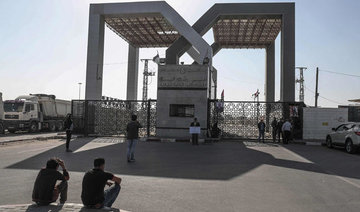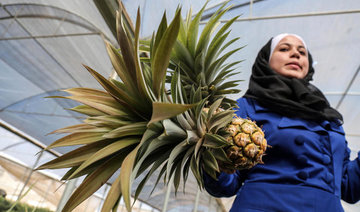GAZA: The Egypt-Gaza border opened under control of the Palestinian Authority for the first time since 2007 on Saturday, raising residents’ hopes for easier passage in and out of the impoverished enclave.
An Egyptian-brokered reconciliation deal last month formally restored Palestinian President Abbas’s administrative control of Gaza, including its border crossings with Israel and Egypt, after a 10-year schism with Islamist Hamas.
Palestinians hope the pact will ease Gaza’s economic woes and help them present a united front in their drive for statehood, although the details of implementation of the deal have yet to be worked out fully.
Citing security concerns, Egypt and Israel maintain tight restrictions at their Gaza borders. Hamas, regarded by the West as a terrorist group, seized the enclave in 2007 after fighting forces loyal to Abbas.
Hamas quit positions at three Gaza crossings and handed them over to Palestinian Authority employees on November 1, in a step seen as vital to encouraging Israel and Egypt to ease their restrictions on the movement of goods and people.
Witnesses said at least five buses loaded with passengers crossed over to the Egyptian side of the Rafah border crossing on Saturday. Hamas-appointed policemen had checked travelers’ documents in a separate hall outside Rafah.
Egypt has not yet signaled any change to its present policy under which it opens the border crossing three times a week.
Palestinians are hoping the crossing will operate full-time, as it had been doing until 2007. About 30,000 Gazans have applied for entry to Egypt in the past few months, according to the Palestinian Interior Ministry.
Egypt will host further talks with Hamas, Fatah and other factions next week on November 21 to discuss major reconciliation issues, including security arrangements and a possible date for Palestinian presidential and parliamentary elections.
Responsibility for security remains an open issue in Gaza, where Hamas, which still polices the territory, has what analysts say are at least 25,000 well-equipped fighters. The group refuses to disarm, as demanded by Israel and the US.
Egypt-Gaza border opens under Palestinian Authority control for first time in a decade
Egypt-Gaza border opens under Palestinian Authority control for first time in a decade

Hamas says ‘new’ Israeli conditions delaying agreement on Gaza ceasefire

“The ceasefire and prisoner exchange negotiations are continuing in Doha under the mediation of Qatar and Egypt in a serious manner... but the occupation has set new conditions concerning withdrawal (of troops), the ceasefire, prisoners, and the return of displaced people, which has delayed reaching an agreement,” the Palestinian militant group said in a statement.
Syria authorities say 1 million captagon pills torched

- Forces pour fuel over and set fire to a cache of cannabis, the painkiller tramadol and around 50 bags of pink captagon pills in the capital’s security compound.
DAMASCUS: Syria’s new authorities torched a large stockpile of drugs on Wednesday, two security officials told AFP, including one million pills of the amphetamine-like stimulant captagon, whose industrial-scale production flourished under ousted president Bashar Assad.
“We found a large quantity of captagon, around one million pills,” said a member of the security forces, who asked to be identified only by his first name, Osama. An AFP journalist saw forces pour fuel over and set fire to a cache of cannabis, the painkiller tramadol and around 50 bags of pink captagon pills in the capital’s security compound.
UK to host Israel-Palestine peace summit

- PM Starmer drawing on experience working on Northern Ireland peace process
- G7 fund to unlock financing for reconciliation projects
LONDON: The UK will host an international summit early next year aimed at bringing long-term peace to Israel and Palestine, The Independent reported.
The event will launch the International Fund for Israeli-Palestinian Peace, which is backed by the Alliance for Middle East Peace, containing more than 160 organizations engaged in peacebuilding between Israelis and Palestinians.
Prime Minister Keir Starmer, a former human rights lawyer who worked on the Northern Ireland peace process, ordered Foreign Secretary David Lammy to begin work on hosting the summit.
The fund being unlocked alongside the summit pools money from G7 countries to build “an environment conducive to peacemaking.” The US opened the fund with a $250 million donation in 2020.
As part of peacebuilding efforts, the fund supports projects “to help build the foundation for peaceful co-existence between Israelis and Palestinians and for a sustainable two-state solution.”
It also supports reconciliation between Arab and Jewish citizens of Israel, as well as the development of the Palestinian private sector in the West Bank and Gaza Strip.
Young Israelis and Palestinians will meet and work together during internships in G7 countries as part of the scheme.
Former Labour Shadow Middle East Minister Wayne David and ex-Conservative Middle East Minister Alistair Burt said the fund is vital in bringing an end to the conflict.
In a joint piece for The Independent, they said: “The prime minister’s pledge reflects growing global momentum to support peacebuilding efforts from the ground up, ensuring that the voices of those who have long worked for equality, security and dignity for all are not only heard, but are actively shaping the societal and political conditions that real conflict resolution will require.
“Starmer’s announcement that the foreign secretary will host an inaugural meeting in London to support peacebuilders is a vital first step … This meeting will help to solidify the UK’s role as a leader in shaping the future of the region.”
The fund is modeled on the International Fund for Ireland, which spurred peacebuilding efforts in the lead-up to the 1999 Good Friday Agreement. Starmer is drawing inspiration from his work in Northern Ireland to shape the scheme.
He served as human rights adviser to the Northern Ireland Policing Board from 2003-2007, monitoring the service’s compliance with human rights law introduced through the Good Friday Agreement.
David and Burt said the UK is “a natural convener” for the new scheme, adding: “That role is needed now more than ever.”
They said: “The British government is in a good position to do this for three reasons: Firstly, the very public reaching out to diplomatic partners, and joint ministerial visits, emphasises the government turning a page on its key relationships.
“Secondly, Britain retains a significant influence in the Middle East, often bridging across those who may have differences with each other. And, thirdly, there is the experience of Northern Ireland.
“Because of his personal and professional engagement with Northern Ireland, Keir Starmer is fully aware of the important role civil society has played in helping to lay the foundations for peace.”
Erdogan announces plans to open Turkish consulate in Aleppo

- Erdogan also issued a stern warning to Kurdish militants in Syria
Turkish President Recep Tayyip Erdogan announced on Wednesday that Turkiye will soon open a consulate in Syria's Aleppo.
Erdogan also issued a stern warning to Kurdish militants in Syria, stating they must either "lay down their weapons or be buried in Syrian lands with their weapons."
The remarks underscore Turkiye's firm stance on combating Kurdish groups it views as a threat to its national security.
Turkish military kills 21 Kurdish militants in northern Syria and Iraq, ministry says

- Turkiye regards the YPG, the leading force within the US-backed Syrian Democratic Forces (SDF), as an extension of the PKK and similarly classifies it as a terrorist group
ANKARA: The Turkish military killed 21 Kurdish militants in northern Syria and Iraq, the defense ministry said on Wednesday.
In a statement, the ministry reported that 20 Kurdistan Workers Party (PKK) and Syrian Kurdish YPG militants, who were preparing to launch an attack, were killed in northern Syria, while one militant was killed in northern Iraq.
“Our operations will continue effectively and resolutely,” the ministry added.
The PKK, designated as a terrorist organization by Turkiye, the European Union, and the United States, began its armed insurgency against the Turkish state in 1984. The conflict has claimed more than 40,000 lives.
Turkiye regards the YPG, the leading force within the US-backed Syrian Democratic Forces (SDF), as an extension of the PKK and similarly classifies it as a terrorist group.
Following the fall of Syrian President Bashar Assad earlier this month, Ankara has repeatedly insisted that the YPG must disband, asserting that the group has no place in Syria’s future.
The operations on Wednesday come amid ongoing hostilities in northeastern Syria between Turkiye-backed Syrian factions and the YPG.
Ankara routinely conducts cross-border airstrikes and military operations targeting the PKK, which maintains bases in the mountainous regions of northern Iraq.
















